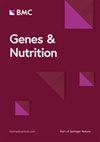Probiotics ameliorate endocrine disorders via modulating inflammatory pathways: a systematic review
IF 3.5
3区 医学
Q1 Medicine
引用次数: 0
Abstract
Probiotics has offered a new prospect to treat and manage a variety of endocrine disorders such as obesity, diabetes, non- alcoholic fatty liver disease and metabolic syndrome. The precise mechanisms by which probiotics exert their beneficial effects on endocrine disorders and its associated problems are still indecisive. It seems that regulating the immune system and suppressing pro-inflammatory pathways like tumor necrosis factor-α and interleukin-6 or triggering anti-inflammatory pathways like interleukin-4 and 10 may be one of the potential mechanisms in the managing of endocrine disorders. In this systematic review, we hypothesized that various probiotic strains (Lactobacillus, Biofidiobacteria, Streptococcus, Entrococcus, Clostridium, and Bacillus) alone or in combination with each other could manage endocrine disorders via modulating inflammatory pathways such as suppressing pro-inflammatory cytokines (IL-6, IL-12, TNF-α, TNF-β, NFκB, and MCP-1), stimulating anti-inflammatory cytokines (IL-4,IL-6, IL-22, IL-23, IL-33, and TGF-β) and maintaining other factors like C-reactive protein, Toll like receptors, LPS, and NK cells. Data source this search was performed in PubMed and Scopus. Both human and animal studies were included. Among more than 15,000 papers, 25 studies were identified as eligible for more assessments. Quality assessment of the studies was cheeked by two researchers independently by title and abstract screening, then article which have inclusion criteria were included, and data retrieved from the included full text studies as the authors had originally reported. Results specified that Lactobacillus has been the most widely used probiotic as well as which one exhibiting the extend of the therapeutic effects on endocrine disorders, especially obesity by modulating immune responses. Also, most studies have revealed that probiotics through suppressing pro-inflammatory pathways specially via reducing levels TNF-α cytokine exhibited protective or beneficial effects on endocrine diseases particularly obesity as well as through decreasing level of IL-6 induced therapeutic effects in diabetes. This systematic review suggests that probiotics could ameliorate endocrine disorders via their immunomodulatory effects.益生菌通过调节炎症途径改善内分泌失调:系统综述
益生菌为治疗和控制肥胖症、糖尿病、非酒精性脂肪肝和代谢综合征等多种内分泌疾病提供了新的前景。益生菌对内分泌失调及其相关问题产生有益影响的确切机制尚不明确。看来,调节免疫系统、抑制肿瘤坏死因子-α和白细胞介素-6等促炎途径或触发白细胞介素-4和白细胞介素-10等抗炎途径可能是控制内分泌失调的潜在机制之一。IL-12、TNF-α、TNF-β、NFκB 和 MCP-1),刺激抗炎细胞因子(IL-4、IL-6、IL-22、IL-23、IL-33 和 TGF-β),并维持 C 反应蛋白、Toll 受体、LPS 和 NK 细胞等其他因子。数据来源 该搜索在 PubMed 和 Scopus 上进行。人类研究和动物研究均包括在内。在 15,000 多篇论文中,有 25 项研究被确定为有资格进行更多评估。研究质量评估由两名研究人员通过标题和摘要筛选独立完成,然后纳入符合纳入标准的文章,并从纳入的全文研究中检索作者最初报告的数据。结果表明,乳酸杆菌是使用最广泛的益生菌,也是通过调节免疫反应对内分泌失调,尤其是肥胖症有最广泛治疗效果的益生菌。此外,大多数研究表明,益生菌通过抑制促炎途径,特别是通过降低 TNF-α 细胞因子的水平,对内分泌疾病,尤其是肥胖症,以及通过降低 IL-6 水平诱导的糖尿病治疗效果具有保护或有益作用。本系统综述表明,益生菌可通过其免疫调节作用改善内分泌失调。
本文章由计算机程序翻译,如有差异,请以英文原文为准。
求助全文
约1分钟内获得全文
求助全文
来源期刊

Genes and Nutrition
Biochemistry, Genetics and Molecular Biology-Genetics
CiteScore
7.90
自引率
0.00%
发文量
14
审稿时长
13 weeks
期刊介绍:
This journal examines the relationship between genetics and nutrition, with the ultimate goal of improving human health. It publishes original research articles and review articles on preclinical research data coming largely from animal, cell culture and other experimental models as well as critical evaluations of human experimental data to help deliver products with medically proven use.
 求助内容:
求助内容: 应助结果提醒方式:
应助结果提醒方式:


